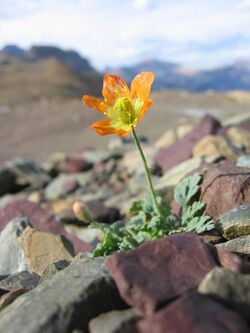Biology:Papaver pygmaeum
| Papaver pygmaeum | |
|---|---|

| |
| Papaver pygmaeum in Glacier National Park | |
| Scientific classification | |
| Kingdom: | Plantae |
| Clade: | Tracheophytes |
| Clade: | Angiosperms |
| Clade: | Eudicots |
| Order: | Ranunculales |
| Family: | Papaveraceae |
| Genus: | Papaver |
| Species: | P. pygmaeum
|
| Binomial name | |
| Papaver pygmaeum Rydb.
| |
Papaver pygmaeum is a species of poppy known by the common name alpine glacier poppy. It is native to North America, where it can be found in British Columbia, Alberta, and Montana. It has a narrow distribution around the intersection of the three borders. There are about 23 known occurrences, mostly in Montana, with some in Alberta and one in British Columbia.[1] It is present in a number of locations within Glacier National Park.[2]
This perennial herb produces a stem up to 12 centimeters tall from a taproot. The blue-green leaves are up to 5 centimeters long. The flower is about 2 centimeters wide. The petals are yellow, orange-pink, or orange with a yellow spot. The fruit is a rough-haired capsule about 1.5 centimeters long.[3] Blooming occurs in July and August.[2]
This plant grows in high mountain habitat in alpine climates. It grows on rocky terrain such as talus and fell fields.[2]
References
- ↑ Papaver pygmaeum. The Nature Conservancy.
- ↑ 2.0 2.1 2.2 Williams, Tara Y. 1990. Papaver pygmaeum. In: Fire Effects Information System, [Online]. U.S. Department of Agriculture, Forest Service, Rocky Mountain Research Station, Fire Sciences Laboratory.
- ↑ Papaver pygmaeum. Flora of North America.
Wikidata ☰ Q7132526 entry
 |


